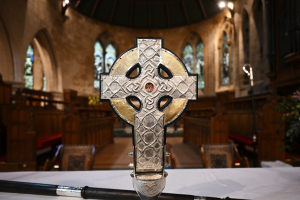How do you deal with your guilt?

The Roman playwright Plautus observed, “Nothing is more wretched than the mind of a man conscious of guilt.” Well, try to imagine a life without any guilt or shame. What choices would you make if you never felt guilty afterwards?
Perhaps you have learned from personal experience that the weight of guilt and the painful consequences of sin tend to be much heavier than the original pressure you felt to give into temptation in the first place. So, is it ever worth it to go against your conscience and do things that you know are wrong?
Some people would rather live with the consequences of wicked behavior than with the restlessness of a guilty conscience. But if deliberate sin goes unchecked, it eventually sears your conscience (1 Timothy 4:2). And this malignant condition leaves you feeling little if any guilt when you sin.
It has been said that 1 in 100 people is a sociopath. People who lack a conscience are liable to do almost anything. Most people live somewhere between the two extremes of a seared conscience on one side, and constant guilt on the other.
Those who assume God will never hold them accountable for their behavior tend to pursue their favorite sins with abandon. Whether you are currently living for God or living in willful sin, make no mistake about it. Judgment Day will be a literal event, and every hour brings you a step closer to your appointment in God’s courtroom (Matthew 12:36; Acts 17:31; Hebrews 9:27; 1 Cor. 4:5; 2 Cor. 5:10; 2 Peter 2:4; Matthew 24:36; Romans 2:16).
“For we must all appear before the judgment seat of Christ, that each one may receive what is due him for the things done while in the body, whether good or bad” (2 Corinthians 5:10).
Judgment Day is the ultimate proof that “a man reaps what he sows” (Galatians 6:7). And yes, the consequences of your behavior are indeed eternal. No matter how hard someone tries to escape the reality of God’s existence, everything eventually leads back to our Creator.
“So, are you telling me Dan that I need to be more religious?” Not exactly. In fact, religion could end up making things worse if you go about it the wrong way. You see, most people assume that performing religious acts is the way to gain God’s acceptance. But God is not impressed or pleased by our efforts to expunge our sins.
Meanwhile, your sins continue to pile up and will be presented in the case against you on Judgment Day. Your offenses include every thought, word, and deed that displeases God and goes against his perfect standard.
The only way to have your slate wiped clean is to come to Christ in repentance and receive forgiveness. Otherwise, the Law will condemn you as a lawbreaker on Judgment Day.
God’s Law reveals our sin, which in turn reveals our need for the Savior to cleanse us. “The Law was put in charge to lead us to Christ” (Galatians 3:24). God uses guilt, and then grace, to draw sinners to the Lord.
The Holy Spirit convicts us of our sins and leads us to the cross (John 16:8-11), where Jesus suffered and died to pay for all of our sins. The crucifixion of Christ and his resurrection from the dead provide our only hope for a glorious future.
Those who never feel guilty about breaking God’s commandments are oblivious to their true spiritual condition. And it is natural to assume that since “God is love” (1 John 4:16), he will not hold you accountable for your sins when you die.
But we must always remember that God is also perfectly holy and just. God would have to go against his nature to leave sin unpunished, and such a thing is impossible. Thankfully, “the punishment that brought us peace was upon him (Christ)” (Isaiah 53:5).
Will you receive Christ by faith (John 1:12) and acknowledge that the Messiah took the punishment you deserve, or will you reject Christ and wind up paying for your sins yourself in Hell?
You would be wise to meditate upon these words from the Apostle John: “Whoever believes in the Son has eternal life, but whoever rejects the Son will not see life, for God’s wrath remains on him” (John 3:36). This reveals one of the biggest misconceptions people have about God.
Man tends to assume that a loving God could not possibly punish anyone who is kind to others. But that is simply not the case. Your personal acts of human kindness may be noble, commendable, and helpful, but your good works are unable to wash away even one of your sins.
Scripture declares that unrepentant sinners are “storing up wrath against themselves for the day of God’s wrath” (Romans 2:5) when no mercy will be shown to those who have rejected the Son.
This is why it is so critical for you to come to the cross today in sincerity, repentance, and faith. Jesus will wash away your sins and replace your guilt with His love and forgiveness. When your sins and guilt are lifted, you will finally be free to love God and enjoy a close relationship with your Creator and Redeemer.
When you bring your sins to Jesus, they are removed from you “as far as the east is from the west” (Psalm 103:12).
Dan Delzell is the pastor of Redeemer Lutheran Church in Papillion, Nebraska.




























